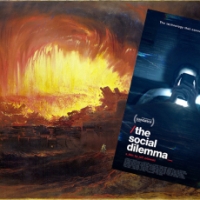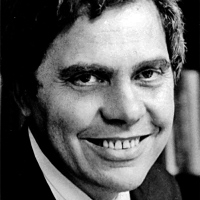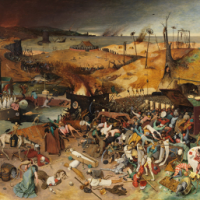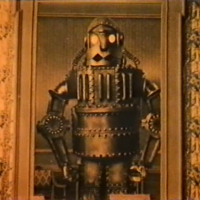“I’m so sick of Y2K!” – A review of Y2K: The Movie
“I’m so sick of Y2K!”
Contrary to the stereotype that every disaster movie begins with the experts being ignored, there is at least one disaster movie that begins with the experts being listened to…and it still not being quite enough.
Granted, the film in question hardly ranks among the best known or most celebrated works of the disaster genre. And this film, of course, is none other than the 1999 made for TV movie: Y2K: the Movie.
As a product of the catastrophic concerns of a very particular moment in time, Y2K: the Movie has faded from memory with good reason. First airing on November 21, 1999 with the impending changeover date only a handful of weeks away, the film was simultaneously feeding off of, and feeding into, the very real anxieties of its time. Yet only two months after the film was released it had quickly become just one more artifact of Y2K panic and paranoia, another example of the way the media had ginned up so much concern over a hazard that in the end did not result in total calamity. Y2K: the Movie is not so bizarre as to be deserving of cult classic status, it is not so terrible as to be deemed “so bad it’s good,” and features none of the unsettling images of cities turned to rubble that are the hallmarks of spectacular disaster films. Nevertheless, as a snapshot of a the very real concerns of a moment in time it remains worthy of consideration, not only for its portrayal of the anxieties surrounding 1999 becoming 2000, but for the ways in which the film highlights the risks of inter-connectivity, the need to pay attention, and the focus it puts on the people responsible for averting disaster.
Y2K: The Movie begins with a plane crash. Or, more accurately, it begins with a Y2K simulation in which a series of cascading failures lead to a (simulated) plane crash. And with the test being conducted on December 30, 1999—there is barely any time left in which to fix remaining issues. Thus, Nick Cromwell (Ken Olin) a computer analyst working for the government informs his superior Martin Lowell (Joe Morton) that it will be necessary to ground all commercial aviation, though Lowell initially balks at this suggestion. If anything does go wrong, Nick and Lowell will be watching for it, as they will be in an impressive command center in Washington D.C.—a space packed with an assortment of computer geeks and government officials who are confident that everything will be alright…but they will be there standing ready if things do wind up going wrong. Meanwhile, a young man in New York City encounters long lines at a bank as worried New Yorkers try to withdraw extra cash “just in case,” while Nick’s family in Seattle find long lines in front of a grocery store that is dealing with a surge in panic buying. As Nick prepares for what he is sure will be a very long night he speaks with his wife Alix Cromwell (Kate Vernon), a doctor at a hospital in Seattle, and urges her to keep their kids with her—he is hopeful that nothing bad will happen, but he knows better than to trust solely in hope.
Assembled in the command post, Nick and the various other members of the rapid response team watch as locales all around the world begin to cross into 2000. And when the Marshall Islands crosses over into 2000 a real plane crash does happen, as an F-18 that was in the air loses control and crashes to the ground. From there, things start going wrong very quickly. Those assembled in the command center watch as more and more signs of failures pop up on their big board, as they nervously await the moment when the US will begin crossing over into 2000. There are outages across Asia and Europe, though a cascading power failure is luckily prevented in France—and to the shock and horror of those assembled Y2K results in a major nuclear reactor failure in Sweden. While those in DC are scrambling, the crowds in Times Square are cheering on the countdown, though their cheers of “happy new year” are swiftly drowned out by cries of terror when the city is plunged into darkness. Cascading power failures snarl the North East of the US, causing a brief loss of power in the DC command center, as Nick and his team rush to figure out what went wrong at that power plant in Sweden only for them to realize in horror that there is a plant of similar design just outside of Seattle (where Nick’s family is). With members of his team in tow, Nick races off to save that nuclear plant, helping to prevent a plane crash in the process. Arriving at the plant, Nick and his team discover that it is in fact experiencing significant issues, and is likely to melt down itself (which would doom Seattle, and Nick’s family). With only seconds to spare, Nick and his team (with some assistance from the military), manage to dramatically save the plant. The film ends with Nick being reunited with his family at the hospital where Alix works, though their “happily ever after” is disrupted by a reminder of the blackouts and other issues still rippling across the world.
To be clear, Y2K: The Movie is a rather silly film. The characters are not particularly complex, the dialogue is consistently bland, the side storylines do not add much of anything to the plot, and though Y2K is framed as the cause—the pivot towards saving the nuclear reactor in Seattle turns the film in its final act into more of a nuclear thriller. All of which is to say, this was a made for TV movie that was aiming to capitalize on the popular concern over an impending deadline. The surprising thing isn’t that the movie is pretty bad, what would have been surprising is if the movie had actually been pretty good.
[And now for an important aside]
Before going any further, it is worthwhile to pause to make a couple of quick points about the year 2000 computing crisis (better known as Y2K). First: Y2K was a real problem that presented genuine risks to many companies/institutions/organizations that were heavily reliant on computers. The scale of these risks were often exaggerated by hyperbolic media reports, but there were very real risks (which many companies/institutions realized when they began testing their systems and encountered various failures). Second: people within the IT community were working on fixing these issues for much of the 90s (and some were working on it even before). At one point in Y2K: the Movie a character notes that folks in the command center had been working on Y2K for the last 2 years, but in reality teams of IT workers had been doing Y2K remediation much earlier. Third: it isn’t accurate to say that “nothing happened.” When 1999 became 2000, there were in fact lots of things that went wrong, (the final report from the Senate’s Y2K Special Committee features 15 pages of reported glitches), though we will likely never know everything that went wrong given that companies that experienced failures were under no obligation to report them. It is true, luckily, that nothing apocalyptic happened, but that just bring us to the next point. Fourth: there is a gulf between what Y2K experts thought might happen, and the way much of the media talked about Y2K. In the late 90s popular media was filled with worrying warnings about planes falling out of the sky and nuclear meltdowns, but by 1999 most of the real Y2K experts were stating that the problems had been mostly fixed and that there would be some bumps in the road but not much else (those experts were right). Fifth, and finally: the reason that we can look back and laugh at Y2K today, is because enough people took the risks seriously at the time and did the work necessary to prevent things from going wrong. When a calamity occurs, people shout “why didn’t we see this coming!” but when people do see a calamity coming, and act to prevent it from happening…people tend to overlook the work that was done, and act as though the risk was never real.
[And now back to the movie]
At the most basic level, Y2K: The Movie is a perfect encapsulation of the way that major media outlets stoked concern about Y2K and then proceeded to further capitalize on those concerns. By the time Y2K: The Movie aired, major publications and media networks had already been regularly airing Y2K related content, and much of that content had a fairly hyperbolic bent to it. While Y2K experts (and many government officials) were eager to supply sober and grounded assessment in what to expect, many of the media storylines routinely elevated fringe figures preparing for doomsday. Worrisome coverage of apocalyptic threats tend to get more viewers, than methodical explanations from an IT professional about how they had gone about fixing the problematic code. The idea that Y2K was going to literally cause planes to fall out of the sky and nuclear power plants to meltdown, was not a sentiment shared by many Y2K experts (especially by 1999), nevertheless works like Y2K: The Movie helped reinscribe those ideas in the popular imagination by portraying those things actually happening. And Y2K: The Movie wasn’t even first to blast this out to a large audience of television viewers: less than a month before Y2K: The Movie aired, cascading blackouts, nuclear power failure, and planes falling out of the sky, were all features of one of the segments of The Simpson’s 1999 Halloween Special (that special clearly played all of this for comedy, yet in depicting planes falling from the sky it was also echoing a narrative that had become widely disseminated). Many of the real people working to handle Y2K, grimaced and grumbled whenever they saw media accounts that raised the specter of planes falling out of the sky, but that was a disastrous image that much of the media just kept coming back to over and over again. After all, a plane falling out of the sky is a much more dramatic image than a database getting polluted with garbage data due to date related errors.
The events depicted in Y2K: The Movie are clearly unsettling. Nevertheless, the film was just portraying a fictional “what if?” as the film itself made clear with words that crawled across the bottom of the screen reading: “The characters and situations depicted in Y2K: The Movie are not based on fact. This program does not imply that any of these events could actually occur.” One can easily imagine that such words were concocted and inserted by an anxious legal department, and yet they also highlight the challenge of getting at the “facts.” By the time Y2K: The Movie aired, there was hardly a shortage of information available about Y2K—The Senate’s Special Committee had published two detailed reports, Congressman Horn had issued 10 Y2K report cards, the Clinton Administration’s Y2K czar John Koskinen was regularly making statements, and reputable Y2K experts were trying to assure the public that the problem had mostly been fixed and that they only anticipated minor disruptions. And yet, there were also plenty of figures warning of impending doom, hocking survival guides, counseling people to flee for the hinterlands, and warning people not to trust government assurances that everything would be fine. Even as it sought to insulate itself by noting that it was not “based on fact,” Y2K: The Movie was very much still participating in muddying the popular discourse about what might happen. It takes a lot less time to watch a made for TV movie than it does to read through mountains of government reports, and despite that warning crawl many viewers of Y2K: The Movie would have found that the scenarios depicted in the film echoed similar warnings they had encountered from other media outlets. Furthermore, it must be noted, even the sober and decidedly not doom-mongering reports issued by government entities, still had a tendency to warn that things might go quite badly.
It would be easy to frame Y2K: The Movie as being nothing more than hyperbolic fear-mongering. And, in fairness, most disaster movies can be accused of trafficking in hyperbolic fear-mongering. Though a factor that certainly distinguishes Y2K: The Movie from other disaster films is that there was a distinct impending deadline on which the hypothetical calamity Y2K: The Movie was hyping would occur. While some may have wished that Y2K: The Movie could have provided a little bit more thoughtful commentary on the underlying roots of the Y2K crisis, even amidst all of its silliness, Y2K: The Movie still features some elements worth reflecting on as they pertain not only to Y2K itself but to other risks more generally.
As was noted at the outset, it is a common trope for disaster movies to begin with experts being ignored. Yet Y2K: The Movie alters this script in some rather interesting ways. From the beginning, Y2K: The Movie foregrounds a variety of experts (who are employed by the government no less), who are working hard to prevent the crisis. Not only are they working right up to the last minute, it is clearly stated that they have already been working on fixing issues for some time. Of course, Nick Cromwell is very much of the opinion that even with all of their preparations that it may not have been enough, and yet the film still highlights the role of trained professionals doing their best to seriously manage and respond to the risks. Disaster films love to portray governments as willfully ignoring a hazard, but in Y2K: The Movie there is ample proof of the government taking the matter very seriously. Considering the disruptions that still occur, it may seem easy to note that the preparedness efforts are ultimately insufficient—yet Nick and his team do manage to safely land a plane, to triage problems popping up all over the country, and to prevent a nuclear power plant from melting down. Just the fact that they were in place, watching, and ready to respond, winds up mattering immensely. The film is clearly not a paean to emergency responders and government bureaucrats, and it is hard to argue that the film is trying to assure viewers that “the experts are on it,” and yet the majority of the film is not focused on hapless abandoned individuals, but on the people who are ready and positioned to respond. Yes, things certainly go wrong in the film, but when the first signs of problems start cropping up and Nick insists that flights should be grounded Lowell responds by grounding those flights. In contrast to recent disaster fare like Don’t Look Up, wherein the entire plot hinges on the inability to take expert warnings seriously and act upon them appropriately, Y2K: The Movie features experts being provided with the institutional support they need to enable them to rapidly respond as the crisis unfolds.
Y2K: The Movie would not have made for particularly interesting viewing if nothing went wrong in it. And thus, despite the presence of all of those hard-working and attentive experts, many things still do go wrong. And it is here that the film gestures in the direction of a major element of the actual Y2K crisis: the risks created by highly interconnected systems. If you dig into the many reports that were being created by business groups and government agencies in the lead up to the year 2000, something you will come across over and over again is wariness about how reliance on computers had interwoven so many different systems. On the one hand, it was precisely all of this connective work that had allowed computers to have such impressive economic power as they streamlined and routinized processes—yet these close connections also made it so that a failure in one spot could spread across many systems. And this is what is portrayed as happening in Y2K: The Movie, failures in a handful of locations, or in a couple of computer systems, are able to quickly cascade throughout the entire system causing larger and larger impacts. The actual Y2K changeover from 1999 to 2000 is just the first proverbial domino that sets off a much larger chain of events—the nuclear power plant issue that Nick and his team rush off to solve is caused by “a computer failure a sensor malfunction and mechanical problem” but it is the computer failure that triggers that sequence of events. Similarly, as the film highlights, by the late 1990s so much essential infrastructure (such as the electric grid) had become computerized, that significant computer failures could risk bringing down that infrastructure (the irony being that you needed the computers working to keep the electricity going, and once the electricity went out it would take the computers down as well). Throughout the 1990s, government report after government report highlighted the ways in which Y2K was revealing how dependent much of the world had become on its computerized systems functioning properly, and Y2K: The Movie captures some of the risks of this interdependence. Granted, Y2K: The Movie does not spend particularly much time questioning any of this, it is simply framed as the new technological status quo on which the world depends—and which therefore had to be maintained.
By the time Y2K: The Movie was released, many people were certainly already feeling overwhelmed and exhausted by the deluge of messages regarding the impending deadline. This sentiment is best captured in the film by Nick’s teenage daughter Kelly, who undoubtedly was speaking for many when she groaned “I’m so sick of Y2K!” And Kelly is hardly the only character in the film who seems to be taking this attitude, twinning it with a belief that there’s nothing to worry about. Thus Kelly, like many others in the film, goes out to greet the arrival of the year 2000 (she heads to a warehouse rave with her hacker friends Kaos and Klipper), only to find herself caught up in the chaos and confusion when things wind up going wrong. While Kelly’s actions may be attributable to the fact that she is a rebellious teen, her comeuppance from initially professing being “sick of Y2K” to finding herself as one of its victims, is as close as Y2K: The Movie comes to having much of a moral. And that moral is: don’t stop paying attention. There was no shortage of Y2K related content covering the airwaves and blanketing headlines in 1999, and this was a glut to which Y2K: The Movie was certainly contributing. A made for TV disaster thriller that was rushed out to capitalize on the concerns of a moment, it is hard to frame Y2K: The Movie as a thoughtful rumination on disaster preparedness. And yet for all of its silliness, at the core of Y2K: The Movie is still a sentiment that it really is worthwhile to still pay attention. To be “sick of” the warnings of any potential hazard may make a certain sort of exhausted emotional sense, but being “sick of” something and being “prepared for” it are two entirely different things. Looking back at Y2K today, it is tempting to act as though everyone who withdrew a bit of extra cash or bought some extra bottled water was caught up in a mindless panic, yet Y2K: The Movie is a useful reminder that many of those people were just doing their best to respond to the mixed messages they were being given about potential risks. And, to be clear, the message to pay attention, and to have some extra things on hand “just in case,” were not just messages coming from silly made for TV movies.
More than twenty years after an anticipated crisis passes without genuine calamity, it is easy to look back with the privilege of posterity and chuckle. And, to be clear, there is much in Y2K: The Movie that is worth laughing about. Frankly, the film is not the best source of information for those who are trying in the present to understand what Y2K was all about, but the film still stands as an important testament to the very real level of ambient concern, and uncertainty, that there was about Y2K in the late 1990s.
Luckily for those who watched Y2K: The Movie, when it came to actual Y2K, the Nick Cromwell’s of the day did their jobs. In fact, they did their jobs so well that many people today have forgotten all of the work those people did to ensure that the problems depicted in Y2K: The Movie would not really happen. Contrary to the well-worn trope that “every disaster movie begins with the experts being ignored,” Y2K (the real event not the movie) was an instance wherein the experts’ warnings were heeded. Though it is not often framed this way: Y2K was a major success story, and it is unfortunate that it is not remembered as such.
So, should you watch Y2K: The Movie? No, you probably shouldn’t. But the next time you find yourself watching a disaster movie in which the experts are being ignored and everything is falling apart, you should spare a moment to think of what a hard time we have remembering the instances where things have gone right.
Related Content
The Lessons of Y2K, 20 Years Later
Theses on Technological Optimism
Theses on Technological Pessimism










Pingback: Waiting for the Fail Whale – What Y2K can teach us about Twitter | LibrarianShipwreck
Pingback: “Y2K is real. It’s coming” – On the Righteous Gemstones and Remembering Y2K | LibrarianShipwreck
Pingback: “Y2K was a very real threat indeed” – a review of the HBO documentary Time Bomb Y2K | LibrarianShipwreck